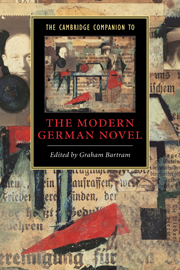Book contents
- Frontmatter
- 1 The German novel in the long twentieth century
- 2 Contexts of the novel
- 3 The novel in Wilhelmine Germany
- 4 Gender anxiety and the shaping of the self in some modernist writers
- 5 Franz Kafka
- 6 Modernism and the Bildungsroman
- 7 Apocalypse and utopia in the Austrian novel of the 1930s
- 8 Images of the city
- 9 Women writers in the ‘Golden’ Twenties
- 10 The First World War and its aftermath in the German novel
- 11 The German novel during the Third Reich
- 12 History, memory, fiction after the Second World War
- 13 Aesthetics and resistance
- 14 The kleiner Mann and modern times
- 15 The ‘critical’ novel in the GDR
- 16 Identity and authenticity in Swiss and Austrian novels of the postwar era
- 17 Subjectivity and women’s writing of the 1970s and early 1980s
- 18 The postmodern German novel
- Index
- Series List
8 - Images of the city
Published online by Cambridge University Press: 28 May 2006
- Frontmatter
- 1 The German novel in the long twentieth century
- 2 Contexts of the novel
- 3 The novel in Wilhelmine Germany
- 4 Gender anxiety and the shaping of the self in some modernist writers
- 5 Franz Kafka
- 6 Modernism and the Bildungsroman
- 7 Apocalypse and utopia in the Austrian novel of the 1930s
- 8 Images of the city
- 9 Women writers in the ‘Golden’ Twenties
- 10 The First World War and its aftermath in the German novel
- 11 The German novel during the Third Reich
- 12 History, memory, fiction after the Second World War
- 13 Aesthetics and resistance
- 14 The kleiner Mann and modern times
- 15 The ‘critical’ novel in the GDR
- 16 Identity and authenticity in Swiss and Austrian novels of the postwar era
- 17 Subjectivity and women’s writing of the 1970s and early 1980s
- 18 The postmodern German novel
- Index
- Series List
Summary
French, English, Russian and American novels have been able to call upon grand, semi-mythical metropolises – Paris, London, St Petersburg, New York – as metaphors, but the German novel has never had a centrally symbolic city that it could call its metaphoric home. To a much greater extent than in these other literatures, cities in German literature have been for the most part either regional or foreign. This reflects in part the tri-national character of literature written in German. Austria and Switzerland, as well as Germany, have produced major German novels. It also reflects the quite different historical, political and social development of all three countries. In addition, within each country there have been, over the centuries, marked regional differences.
This situation has posed a particular problem for the novel written in German in the twentieth century. In the heyday of realism, in the later nineteenth century, what we might call regional urbanism (to the extent that novels in German were urban) was the norm in prose; Gottfried Keller’s Swiss towns and cities, Fontane’s Berlin, and even the L‥ ubeck of Thomas Mann’s Buddenbrooks all revel in detailing specifics of geography, language and customs in representing the particular culture of particular cities. But if one jumps ahead only ten years from Buddenbrooks (1901) to Rilke’s novel Die Aufzeichnungen des Malte Laurids Brigge (1910; The Notebooks of Malte Laurids Brigge, 1930), in which the cities, Paris, St Petersburg and Venice, are not German at all, one has entered an entirely different urban world. Gone are the fixed hierarchies of class, speech and local customs that mark the life of a particular city; instead, in Rilke’s Paris we are inside the fragmented consciousness of a would-be poet who is trying desperately, and without much success, to create art out of his fugitive sense-perceptions and impressions of a hostile and unyielding urban reality.
- Type
- Chapter
- Information
- The Cambridge Companion to the Modern German Novel , pp. 110 - 122Publisher: Cambridge University PressPrint publication year: 2004



